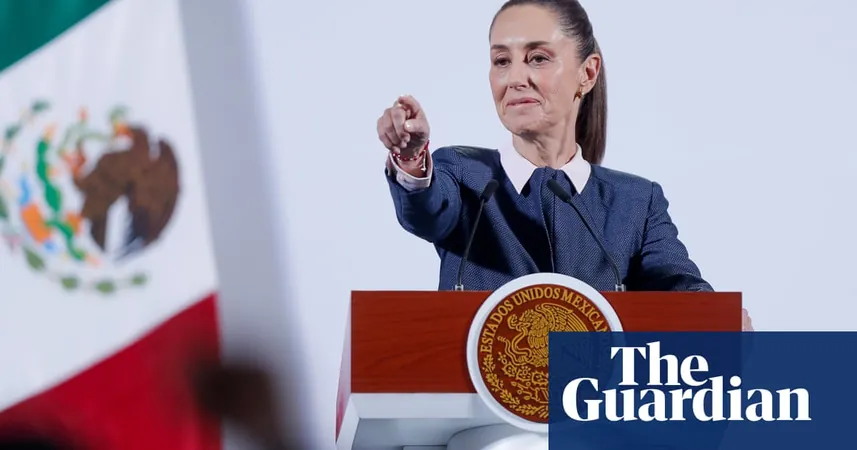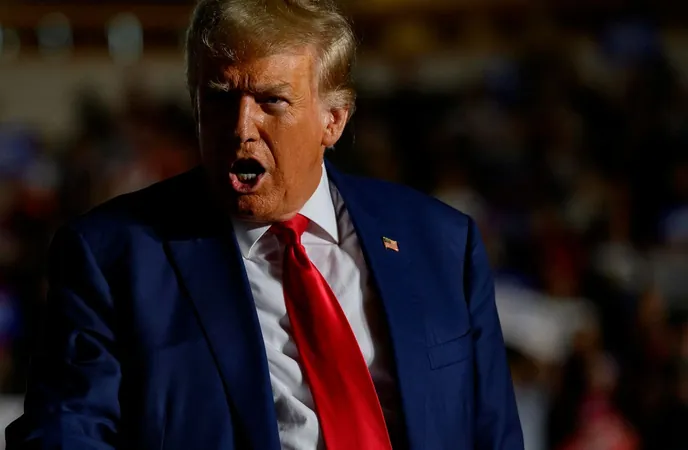
Mexico's President Warns Against Trump’s Tariff Threats: A Potential Trade War on the Horizon?
2024-11-26
Author: Olivia
Introduction
Mexico’s President Claudia Sheinbaum slammed former President Donald Trump’s recent proposal to impose a 25% tariff on all imports from Mexico and Canada, asserting that such a plan would be ineffective in curbing the rampant flow of migrants and drugs into the United States. Sheinbaum declared that if Trump proceeded with his tariffs, Mexico would retaliate in kind, turning the situation into a potential trade war that could adversely affect economic stability in both nations.
Sheinbaum's Statement
“Each tariff would simply lead to another in retaliation, risking livelihoods on both sides of the border,” Sheinbaum stated. “The consequences would be inflation and job losses. What sense does that make?”
Trump's Proposal and Legal Concerns
Trump’s plan, shared on his Truth Social account, aimed to stop what he referred to as an "invasion" of drugs and migrants, particularly focusing on fentanyl. However, experts underscore that the legality of such tariffs is questionable, given the existing US-Mexico-Canada Agreement (USMCA) that governs trade between the three parties.
Expert Opinions
Valeria Moy, a prominent Mexican economist, expressed skepticism about Trump adopting a more institutional approach, hinting instead at a potential return to a more authoritarian political style. “The Trump we see emerging now is someone who will act with more determination and less regard for established regulations,” she warned.
Public policy analyst Viri Ríos cautioned that while these tariffs might offer Trump a short-term political victory, especially pleasing to his electoral base, they could ultimately harm the U.S. economy. A staggering 25% tariff on Mexican goods would result in more than $125 billion in costs to the U.S. economy over a decade, contributing to a decrease in Gross Domestic Product (GDP) by up to 0.74%.
Broader Implications
The implications of such tariffs extend far beyond trade disputes. U.S. businesses relying on Mexican imports would likely be forced to increase prices, affecting American consumers directly—a demographic Trump previously relied upon for electoral success. “If consumer prices skyrocket because of these tariffs, it could politically backfire for Trump,” Ríos noted.
Moreover, analysts have pointed out that the ongoing drug crisis in the U.S. is primarily driven by domestic demand rather than supply routes from Mexico. "It’s a bit like scapegoating; addressing the drug trade requires looking inwards at American consumption habits rather than blaming Mexico," Ríos added.
Conclusion
Ultimately, it’s believed that Trump’s proposal is aimed at coercing Mexico into negotiations to strengthen migration and security policies that could more effectively tackle drug trafficking. “This strategy is familiar territory for Trump—using threats to mandate discussions and force concessions,” said Moy. "He essentially wants to negotiate under duress: 'What are you going to do about the flow of migrants and drugs? If you don’t comply, I’ll impose tariffs.'"
With tensions escalating and both nations facing tough economic realities, the coming months could see the re-emergence of a contentious trade relationship that may not only influence domestic policies in the U.S. but also reshape its interactions with one of its closest trading partners.









 Brasil (PT)
Brasil (PT)
 Canada (EN)
Canada (EN)
 Chile (ES)
Chile (ES)
 España (ES)
España (ES)
 France (FR)
France (FR)
 Hong Kong (EN)
Hong Kong (EN)
 Italia (IT)
Italia (IT)
 日本 (JA)
日本 (JA)
 Magyarország (HU)
Magyarország (HU)
 Norge (NO)
Norge (NO)
 Polska (PL)
Polska (PL)
 Schweiz (DE)
Schweiz (DE)
 Singapore (EN)
Singapore (EN)
 Sverige (SV)
Sverige (SV)
 Suomi (FI)
Suomi (FI)
 Türkiye (TR)
Türkiye (TR)